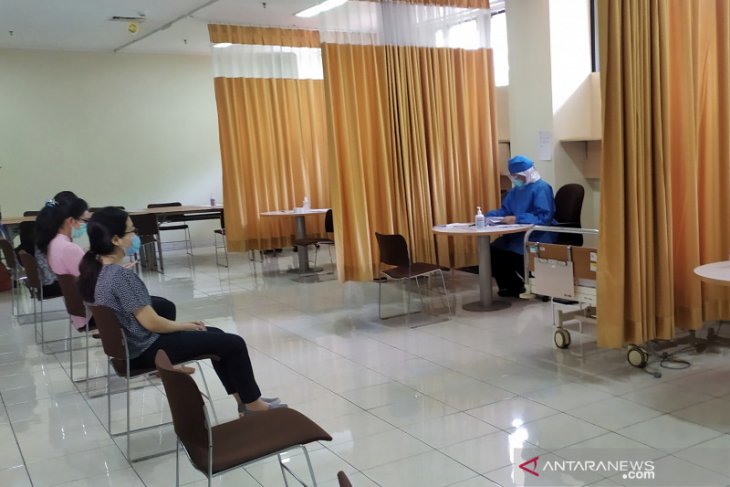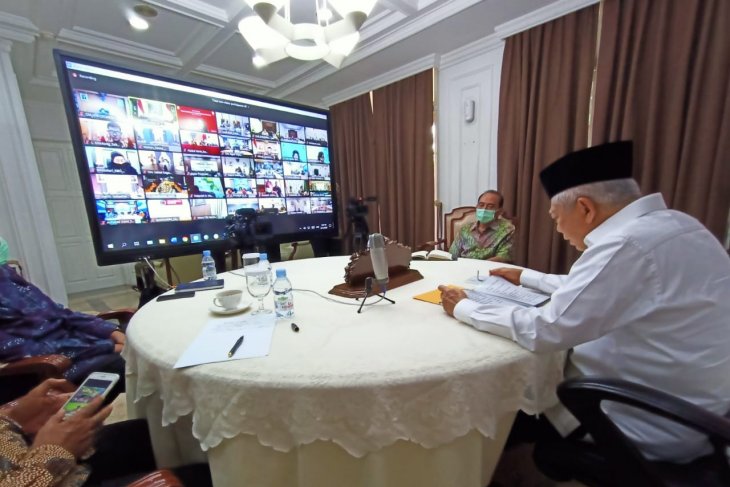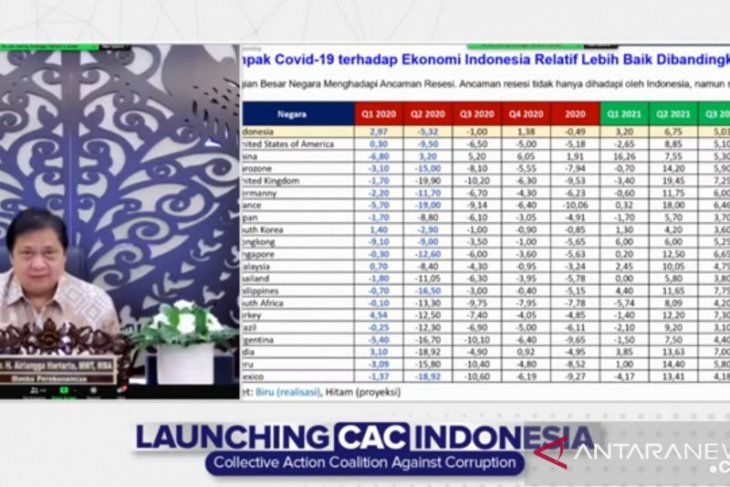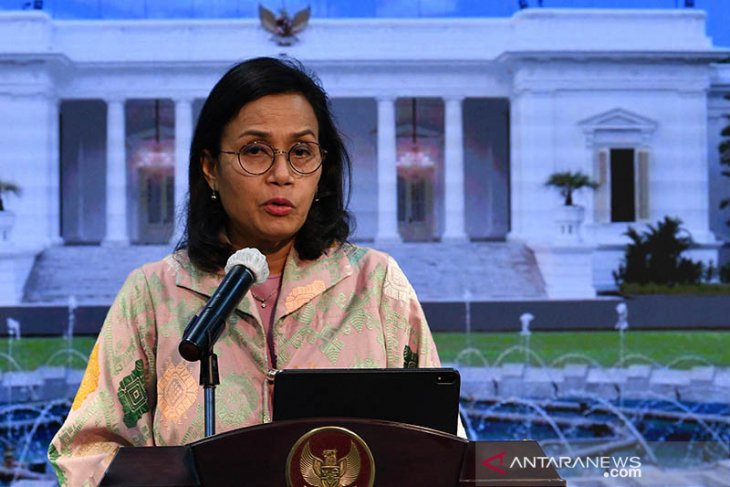Live Streaming
Program Highlight
Company Profile
August
Bio Farma Ensures Indonesians Given Priority in Vaccine Distribution
Written by Ani Hasanah
The Sinovac COVID-19 vaccine clinical trial research at Bandung’s Padjajaran University Hospital, West Java. ANTARA/Bagus Ahmad Rizaldi/ac.
PT Bio Farma Director Honesti Basyir has made assurance that Indonesians will be prioritized during the distribution of the COVID-19 vaccine after passing the clinical trial period and securing permission for production.
"The priority is for domestic (use) first," Basyir stated at the Padjajaran Institute Hospital in Bandung, West Java, on Tuesday.
As per calculations, 160 million Indonesians will be prioritized to receive the vaccine that originated from China's Sinovac.
The Bio Farma director noted that each individual will have to be administered two doses of the vaccination.
"Next year, the target is set to vaccinate 160 million members of the population, with each individual receiving two doses, thereby translating to the fact that we will require to prepare 320 million doses," he stated.
Basyir noted that once the vaccination requirements for Indonesians were met, Bio Farma will then consider exporting the vaccine to other countries.
Currently, the company is awaiting the conclusion of the clinical trial process as well as the licensing phase from the Food and Drug Supervisory Agency (BPOM) that is targeted for completion in January 2021.
Furthermore, Basyir stated that Bio Farma had an annual production capacity of 100 million vaccines. By December 2020, the company will have a new building, thereby leading to another 150 million doses being added to their annual production.
"The president is looking at a new building that can result in the added production of 150 million doses per year. It will be completed in December. Thus, in terms of capacity, we will be ready (to produce) 250 million doses in December," he expounded.
In the meantime, President Joko Widodo was optimistic that the vaccine, still under the clinical trial phase, would be able to tackle the COVID-19 pandemic in Indonesia while prioritizing its citizens.
"We are optimistic that with the finding of the vaccine, we would be able to distribute vaccines to all Indonesians," he added. (ANTARA)
August
Rules Drafted for Second Round of Dissolution of State Institutes
Written by Ani Hasanah
Vice President Ma'ruf Amin opens an online coordination meeting on the simplification of the bureaucracy in Jakarta on Tuesday (August 11, 2020). (ANTARA/HO-Asdep Komunikasi dan Informasi Publik (KIP) Setwapres)
A presidential regulation has been drafted for the second round of the dissolution of state institutes, including working teams, boards, and committees, at the end of August, 2020, said Administrative and Bureaucratic Reform Minister, Tjahjo Kumolo.
“Right now the Ministry of Administrative and Bureaucratic Reform, the State Personnel Board (BKN), the Finance Ministry, and the State Secretariat have prepared a draft presidential regulation on the second round of the dissolution (of state institutes),” he said, while opening a virtual coordination meeting on bureaucratic simplification along with Vice President Ma'ruf Amin in Jakarta on Tuesday.
The second round of the dissolution of 11-13 state institutes is a follow-up to the disbanding of 18 institutes by President Joko Widodo through Presidential Regulation No. 82/2020 on the Committee for the Handling of COVID-19 and National Economic Recovery.
“In syaa Allah (God willing), 12 to 13 more institutes will be dissolved at the end of August, 2020,” he said.
The disbanding of state institutes, which were set up based on presidential decrees and laws, is part of efforts to streamline the bureaucracy since their tasks overlapped those of ministries and non-ministerial government institutions, he elaborated.
He said it takes a long time to dissolve state institutes that are set up based on law because disbanding them requires a seal of approval from the House of Representatives (DPR).
“We also recommend the dissolution or integration of boards or institutes set up based on law. It takes time and (due) process because they must be discussed with DPR,” he explained.
Meanwhile, Vice President Ma'ruf Amin said the simplification of state institutes will make the bureaucracy more effective, efficient, and proactive in solving a wide range of issues.
“Bureaucracy must be able to produce decisions quickly and accurately. Bureaucracy can move dynamically if it has a proportional structure, in accordance with the needs,” he noted. (ANTARA)
August
Indonesian Economy to Contract 0.49 Percent This Year: Minister
Written by Ani Hasanah
Indonesian Coordinating Minister for Economic Affairs, Airlangga Hartarto, has predicted the Indonesian economy will contract 0.49 percent this year as a result of the COVID-19 pandemic.
“Hopefully, it (the economy) will improve in the third quarter. It is predicted to grow minus two or minus one percent. But, we hope it will grow positively,” he said while launching the coalition of joint action against corruption (CAC) at an online event in Jakarta on Tuesday.
The Indonesian economy is expected to contract 1 percent in the third quarter of 2020 and to grow 1.38 percent in the fourth quarter of this year, he said adding, overall, the economy is expected to contract 0.49 percent this year.
He said the impact of the COVID-19 pandemic on the Indonesian economy has been relatively less severe than other countries.
The Central Statistics Agency (BPS) had announced earlier that the Indonesian economy contracted 5.32 percent in the second quarter of 2020 from 2.97 percent in the previous quarter.
Several other countries also saw their economies fall deeper into a decline in the second quarter.
Hartarto said the US economy contracted 9.5 percent, the British economy 19.9 percent, and the French economy 19 percent in the second quarter. In fact, the last two countries suffered a recession, he remarked. (ANTARA)
August
Government to Disburse Aid for MSMEs in August
Written by Ani Hasanah
Finance Minister Sri Mulyani Indrawati. (ANTARA PHOTO/Sigid Kurniawan/POOL/foc/aa./sh)
The Indonesian government will distribute productive assistance of Rp2.4 million per person to 13 million operators of micro, small and medium-scale enterprises (MSMEs) in August, 2020, Finance Minister Sri Mulyani Indrawati said.
“We are planning to disburse the aid using the data gleaned in August. Maybe on August 17, 2020 or later, (the aid program will be launched) by the President or a minister,” Indrawati said at an online discussion here on Tuesday.
The minister said aid disbursement has been a challenge in terms of data collection, especially when it comes to unbankable MSMEs.
Micro financing units UMi and Mekaar have pegged the number of MSMEs at six million and two million, respectively, while state pawnshop firm, PT Pegadaian, has recorded four million MSMEs, and 1.5 million cooperative units.
“We have allocated Rp28.8 trillion of budget, and now, we are in the process of data collection and verification,” the minister added.
The minister admitted that the data obtained from the Social Affairs Ministry did not match the real conditions in the field as it had not been updated since 2015.
“Not all local governments updated the data until we had this COVID-19 crisis in 2020. We need the latest data,” she said.
The government needs to update the data so that social assistance is on target.
"The aid program will be audited by an external auditor, such as BPK (State Audit Agency)," Indrawati noted.
In addition, updating of data is necessary to avoid uneven distribution of aid, which could spark a public reaction, she said. (ANTARA)


